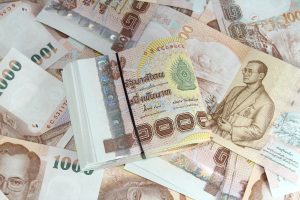Myanmar’s military-led administration has agreed to accept Thai baht as an official currency in border trade dealings and plans a similar arrangement for use of India’s rupee, seeking to limit the country’s reliance on the U.S. dollar in trade.
The State Administration Council said Tuesday that Myanmar began allowing direct currency settlements using the Chinese renminbi with its kyat earlier this year. Settlements in Thai baht will be done online according to regulations set by Myanmar’s central bank, it said in a statement.
Myanmar’s economic crisis deepened after its army seized power in February 2021 from the elected government of Aung San Suu Kyi. Opposition to the military takeover has evolved into armed resistance that some U.N. experts have described as civil war.
The turmoil, sanctions against the military leadership, and the pandemic have combined to severe strain the country’s ability to earn foreign exchange. Meanwhile, the value of the kyat has plunged.
By expanding direct conversion of other currencies in border trade, Myanmar intends to reduce its dependence on the U.S. dollar by up to 70 percent, the statement cited Maung Maung Ohn, minister of Information, and Aung Naing Oo, minister of Investments and Foreign Economic Relations, as saying.
Thailand is Myanmar’s second largest trading partner after China, with border trade at five checkpoints — Tachileik, Myawady, Kawthoung, Myeik, and Hteekhee — amounting to $4.3 billion in fiscal 2020-2021, up from $3.9 billion the year before, the statement said.
“Myanmar’s immediate neighbors account for up to 70% of the country’s total trade volume. Direct non-dollar currency settlements will help to broaden and facilitate bilateral trade, flow of goods and other forms of payment and settlement,” the statement said.
It blamed shortages of hard currency and a collapse in the value of the kyat on “economic sabotage” from opponents of the military takeover and “foreign elements.”
The statement also blasted some unnamed countries for trying to block Myanmar’s inclusion in the Regional Comprehensive Economic Partnership, or RCEP.
The Philippines and New Zealand have said they would reject the inclusion of Myanmar in what is expected to become the world’s largest free trade pact.
“For all member countries to benefit from economic integration, an all-inclusive manner is needed in ASEAN.” the statement said. “No country should lag in regional economic integration. Sadly, some of ASEAN’s directions and actions appear mismatched on the ground,” it said.
Myanmar plans to update members of the Association of Southeast Asian Nations at a meeting of economic officials this week, Aung Naing Oo said.

































